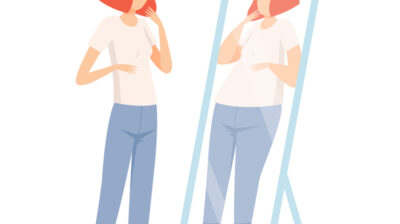OSFED: the signs, symptoms and treatment
Other specified food or eating disorder (OSFED) is a mental health condition that can affect people of any gender, age, sexual orientation and ethnicity. With the right help and support, people with OSFED can and do recover.

Other specified feeding or eating disorder (OSFED) is an eating disorder designed to provide a diagnosis for people whose eating disorder symptoms do not fully align with other eating disorder diagnoses, like anorexia, bulimia, or binge eating disorder.
In the past, OSFED was called ‘eating disorder not otherwise specified’ (EDNOS). People may receive an OSFED diagnosis if they don’t meet the full criteria to be diagnosed with another disorder, such as anorexia, bulimia, or binge eating disorder. Alternatively, a mental health professional may diagnose a person with OSFED if they are experiencing symptoms from multiple different eating disorders. This happens a lot, making OSFED the most commonly diagnosed eating disorder. Like all eating disorders, OSFED causes significant and distressing symptoms that can impact a person’s daily life and functioning.
Why do people develop OSFED?
OSFED is a broad diagnosis that is divided into a number of subtypes, each with its own set of symptoms. This means that a professional may diagnose two people with OSFED even if they do not share any of the same symptoms.
It is not always clear why someone develops OSFED, and the specific causes are different for different people. Worries about body image can often play a role. While OSFED can seem like it’s all about food and body size, the root causes are usually much more complex, including biological, social, emotional and psychological factors.
Mental health difficulties like anxiety and low self-esteem, a family history of eating disorders, addiction, or traumatic experiences like sexual abuse are all associated with developing OSFED. To better understand how OSFED affects a person, it can be helpful to think of it as a coping mechanism.
People with OSFED tend to control food and their body to manage emotional distress. Their eating patterns can help them feel in control when other aspects of their life are making them feel out of control or unsafe. Recognising this can make it easier to understand how scary it can be to stop engaging in eating disorder behaviours.
OSFED subtypes
OSFED is an umbrella term that covers a number of different eating disorder subtypes. Each OSFED subtype comes with a list of symptoms that are similar to, but not exactly the same as, those for other eating disorders.
Below is a list of common OSFED subtypes. OSFED is a broad diagnosis and these subtypes are just a few common examples of how this condition can affect people. You may be experiencing a completely different combination of symptoms to those listed above. However, what you’re experiencing may still be classified as a form of OSFED.
Atypical anorexia nervosa
People who experience anorexia have an intense fear of gaining weight. This can cause them to significantly restrict their food intake and engage in other behaviours to prevent weight gain. As a result, individuals with anorexia can become medically underweight. In this OSFED subtype, a person may experience many symptoms of anorexia but will not be not medically underweight.
Bulimia nervosa of low frequency or limited duration
People who experience bulimia experience episodes of binge eating where they eat large quantities of food in one short period accompanied by feelings of being out of control. After these binge episodes, people often feel guilty and try to compensate for the binge eating by purging (i.e., vomiting) or getting food out of their body as quickly as possible. A person will be diagnosed with bulimia if they have been experiencing these cycles at least once a week for a period of 3 months or longer. In this OSFED subtype, a person is experiencing all the symptoms of bulimia but isn’t engaging regularly in binge eating or purging behaviours.
Binge eating disorder of low frequency/limited duration
People with binge eating disorder experience episodes of binge eating where they eat a lot of food in one short period. A person can be diagnosed with binge eating disorder if they engage in binge eating episodes at least once a week for a period of 3 months or longer. In this OSFED subtype, a person experiences all the symptoms of binge eating disorder, but doesn’t habitually engage in binge eating.
Purging disorder
People with bulimia engage in binge eating episodes where they eat large quantities of food all at once. After these binge episodes, people often feel guilty and try to compensate for the binge eating by purging or getting food out of their body as quickly as possible. In this OSFED subtype, a person uses purging behaviours to change their weight or shape, but does not engage in binge eating.
Night eating syndrome
In this OSFED subtype, a person engages in overeating at night time and also experiences sleeping problems. This subtype can sometimes lead to a pattern where you eat a large evening meal, struggle to fall asleep, or wake up during the night, and then eat more food later in the night. People with night eating syndrome may be distressed by their night-eating but feel they have to do it to get to sleep.
Treatment for OSFED
If you suspect you’re experiencing some of the symptoms listed above, you might be tempted to ignore them or try to avoid the subject. However, it’s important to recognise that you deserve to reach out for help and support. No matter how hard it may seem, it is possible to make a recovery.
Recovery is not always linear and setbacks are common. Everyone’s recovery journey is different and it may take time, but you can recover from OSFED.
Getting help for OSFED
If you think you may have OSFED, going to your GP as soon as you can and letting them know what’s going on is an important first step. They will be able to point you in the right direction to get the best treatment for your needs. Sometimes the idea of speaking to your GP about eating concerns can be daunting. If you feel like you’re not ready to take that step just yet, consider calling the Bodywhys helpline. Their helpline, delivered by a team of trained volunteers, is open to anyone. The helpline offers non-judgemental and confidential support and information about eating disorders.
If you are worried about a friend or family member, talk to them and encourage them to see their GP. You can also offer to go with them if they don’t want to go alone.
Trying to recover from OSFED, or any eating disorder, by yourself can be really isolating and hard. Reaching out for support from professionals, family, and friends can make all the difference and help to get you through.
How treatment works
Because there is such a diverse range of symptoms associated with OSFED, the types of treatment you receive can depend on your situation. In general, the treatment will help you address the behaviours that are affecting your food intake and body size. It will also help you work on the thoughts, feelings and experiences that are driving these behaviours.
Getting treatment that is evidence-based and specialised for eating disorders makes a substantial difference to a person’s recovery and quality of life. Most people benefit from a combination of talk therapy and nutritional support. Talk therapy can help with the psychological side of OSFED, while nutritional support promotes recovery of a person’s physical health.
Talking therapy and family therapy
Talking therapy or group therapy is usually a part of treatment for OSFED. Some people will take part in individual talk therapy, while others (especially young people) might engage in family-based treatment (FBT). FBT is a type of systemic family therapy. The aim of talk therapy is to help you understand the root causes of your eating disorder. It can help you work towards developing a more comfortable relationship with food.
Many professionals use an adapted form of Cognitive Behavioural Therapy (CBT), called CBT-E, to support people in their recovery from OSFED. CBT-E incorporates strategies that specifically address eating disorders and their core symptoms.
CBT-E looks at the ways that our thoughts affect our behaviours and feelings. Through CBT-E, you may:
- Develop strategies for building self-awareness
- Identify triggers
- Create helpful routines
- Manage compulsive thoughts and unhelpful behaviours
If you are under the age of 18, you may take part in family-based treatment (FBT). FBT will explore how OSFED has impacted you and focus on ways your family can support your recovery.
Other sources of support for OSFED
You can reach out to Bodywhys for advice or information on OSFED. Bodywhys is the Eating Disorders Association of Ireland and provides confidential support, information and understanding to those affected by eating disorders. You do not need a diagnosis to talk to Bodywhys.
How friends and family can help
Setting out on a recovery journey can be daunting, but you don’t have to do it alone. It can be easier to recover from OSFED when the people around you take the time to learn about how the condition impacts you and how they can show understanding and support. If you found the information in this article helpful, consider sharing it with some of the people in your life.
Feeling overwhelmed and want to talk to someone?
- Get anonymous support 24/7 with our text message support service
- Connect with a trained volunteer who will listen to you, and help you to move forward feeling better
- Whatsapp us now or free-text SPUNOUT to 50808 to begin.
- Find out more about our text message support service
If you are a customer of the 48 or An Post network or cannot get through using the ‘50808’ short code please text HELLO to 086 1800 280 (standard message rates may apply). Some smaller networks do not support short codes like ‘50808’.






